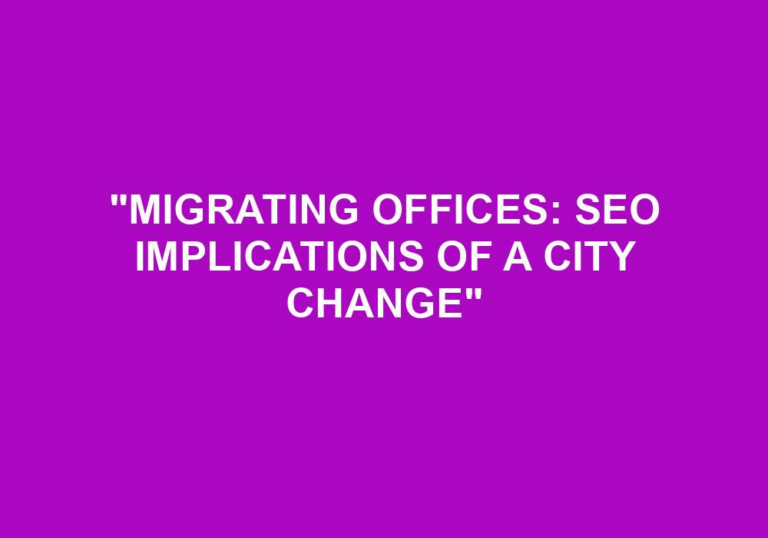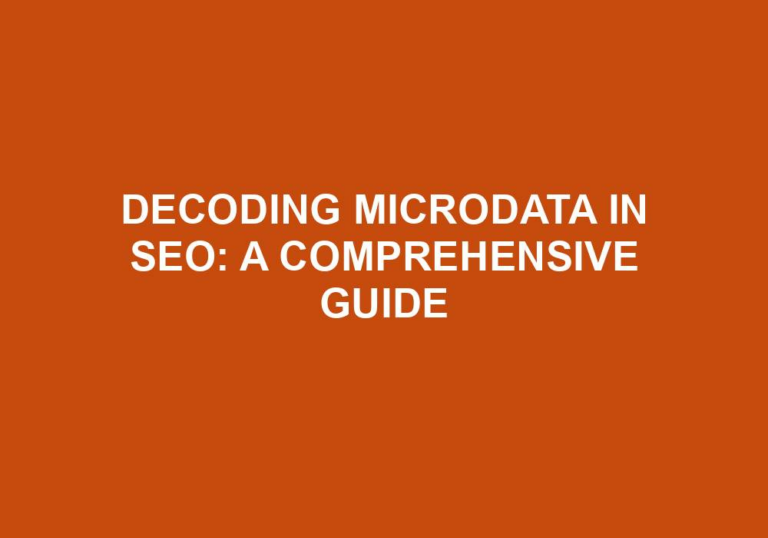Welcome, young sleuths, to the world of SEO detective work! Today, we’re going to uncover the secrets of determining a website’s keywords. So, put on your detective hats and get ready to dive into the fascinating world of SEO.
Have you ever wondered how search engines like Google figure out which websites to show when you type in a query? Well, they rely on keywords, which are the words or phrases that summarize the content of a webpage. Understanding a website’s keywords is like having a secret decoder ring that unlocks the mysteries of search engine rankings.
In this adventure, we’ll learn how to uncover those keywords using some clever SEO detective work. Get ready to crack the code and discover the hidden language that drives website visibility in search results. So, grab your magnifying glass and join me on this thrilling journey to uncover a website’s keywords. Let’s get started!
Is your website ranking low on search engines? Unlock its full potential by uncovering the keywords that will boost your visibility. Follow these steps to become an SEO detective:
- Start with meta tags and title tags.
- Use keyword research tools like Google Keyword Planner.
- Analyze your website’s content and look for relevant keywords.
- Explore competitors’ websites for keyword inspiration.
- Monitor your website’s performance and adjust your keyword strategy accordingly.
Become the Sherlock Holmes of SEO and watch your website climb the ranks!
SEO Detective Work: How to Determine a Website’s Keywords
Website optimization is the cornerstone of successful digital marketing. And at the heart of any effective SEO strategy lies keyword research. By identifying the right keywords, you can unlock a wealth of opportunities to boost your website’s visibility and drive targeted traffic. But how do you go about determining the keywords your competitors are targeting and the ones that will resonate with your audience? In this article, we’ll dive into the world of SEO detective work and explore the methods and tools you can use to uncover a website’s keywords.
1. On-Page Analysis: An Inside Look
When conducting keyword research, one of the first places to look is the website itself. By analyzing the website’s content, meta tags, and headings, you can gain valuable insights into the keywords it’s targeting. Start by examining the page titles and meta descriptions. These elements offer a sneak peek into the website’s keyword strategy. Look for keywords that are consistently used across different pages, as this indicates their relevance and importance to the website’s overall theme. Additionally, pay attention to the headings and subheadings used throughout the content. These often provide clues about the primary topics and keywords being emphasized.
A powerful tool in your detective toolkit is Google’s cache feature. By viewing the cached version of a website, you can see how search engines interpret and index the content. This can give you valuable information about the keywords they associate with the website. To view the cached version of a webpage, simply search for the website on Google, click the dropdown arrow next to the URL, and select “Cached.”
The Benefits of On-Page Analysis:
On-page analysis allows you to gain insights directly from the source – the website itself. It enables you to understand the keywords the website is targeting and how it is optimizing its content. By uncovering these insights, you can identify the gaps in your own SEO strategy and make informed decisions about the keywords you should be targeting.
2. Spy on Competitors: Discover Their Secret Sauce
In the world of SEO, competition is fierce. To stay ahead of the game, it’s essential to keep a close eye on your competitors. By analyzing their websites, you can uncover the keywords they are targeting and gain valuable insights into their SEO strategies. One way to do this is through competitor analysis tools, such as SEMrush or Ahrefs. These tools provide detailed reports on your competitors’ top organic keywords, backlinks, and overall website performance.
Another method is to manually analyze your competitors’ websites. Look for patterns in their content, meta tags, and headings. Are there specific keywords that appear frequently? Do they focus on a particular niche or topic? By reverse-engineering your competitors’ SEO strategies, you can gain inspiration and identify opportunities to outperform them.
The Benefits of Competitor Analysis:
Competitor analysis allows you to gain a comprehensive understanding of the landscape in which you’re operating. It provides insights into the keywords your competitors are targeting and helps you identify untapped opportunities. By learning from their successes and failures, you can fine-tune your own SEO strategy and position yourself for success.
3. Keyword Research Tools: Unleash the Power of Data
When it comes to finding keywords, a detective’s best friend is a reliable keyword research tool. These tools provide invaluable data and insights that can help you identify high-value keywords and optimize your website accordingly.
One of the most popular keyword research tools is Google’s Keyword Planner. This free tool allows you to discover new keywords, analyze search volumes, and get performance insights for specific keywords. By using the Keyword Planner, you can uncover relevant keywords and gauge their potential value in terms of search volume and competition.
Other powerful keyword research tools include Moz’s Keyword Explorer, Ahrefs’ Keywords Explorer, and SEMrush’s Keyword Magic Tool. These tools offer advanced features like competitor analysis, keyword difficulty scoring, and SERP analysis, allowing you to dive deep into the world of keywords and uncover hidden gems.
The Benefits of Keyword Research Tools:
Keyword research tools provide data-driven insights that can significantly enhance your SEO strategy. They allow you to identify high-value keywords, understand search volume and competition, and gain valuable insights into user intent. By leveraging the power of these tools, you can make informed decisions and optimize your website for maximum visibility and engagement.
Additional Topics Related to “SEO Detective Work: How to Determine a Website’s Keywords”
4. Understanding User Intent: The Key to Keyword Optimization
Understanding user intent is crucial when it comes to keyword optimization. By analyzing the intent behind different search queries, you can align your content with what users are looking for. In this section, we’ll explore the various types of user intent and how you can optimize your keywords to meet those intents.
5. Long-Tail Keywords: Beyond the Basics
Long-tail keywords are an essential part of any comprehensive SEO strategy. In this section, we’ll delve into the world of long-tail keywords and discover their unique advantages and how to identify and optimize for them.
6. The Power of Local SEO: Optimizing for Local Keywords
If you run a brick-and-mortar business or provide services in a specific geographic area, local SEO is the key to success. In this section, we’ll explore the world of local SEO and uncover the best strategies for optimizing your website for local keywords.
#4. Understanding User Intent: The Key to Keyword Optimization
In the world of SEO, understanding user intent is crucial. User intent refers to the reason behind a search query – what the user hopes to find or achieve with their search. By analyzing and optimizing for user intent, you can align your keywords with what users are looking for, resulting in higher rankings and increased visibility. In this section, we’ll explore the various types of user intent and how you can optimize your keywords to meet those intents.
7. Informational Intent: Educate and Inform
Informational intent is the most common type of user intent. Users with informational intent are seeking answers to their questions or looking for specific information. These users are not necessarily looking to make a purchase or take a specific action. To optimize for informational intent, focus on keywords that are aligned with answering questions or providing valuable information. Use words like “how to,” “tips,” or “guide” to target users with informational intent.
When optimizing for informational intent, it’s important to provide high-quality, comprehensive content that answers the user’s query in detail. Consider using structured data markup to enhance the visibility of your content in search engine results. This will help search engines understand the nature of your content and present it to users with informational intent.
8. Navigational Intent: Directing Users to a Specific Website
Navigational intent refers to users who are looking for a specific website or web page. These users already have a destination in mind and are using search engines as a means of navigation. Optimizing for navigational intent involves targeting keywords that are directly related to your website or business. This could include your brand name, product names, or specific URLs.
To optimize for navigational intent, ensure that your website is easy to navigate and has clear, concise URLs. This will make it easier for users with navigational intent to find the information they are looking for. Additionally, consider using sitelinks in your search engine results to provide users with direct links to relevant pages on your website.
9. Transactional Intent: Driving Conversions and Sales
Transactional intent refers to users who are ready to make a purchase or take a specific action. These users are further down the sales funnel and are looking for specific products, services, or deals. To optimize for transactional intent, focus on keywords that are related to specific products or services. Include words like “buy,” “purchase,” or “deal” to target users with transactional intent.
When optimizing for transactional intent, it’s important to provide clear and concise information about your products or services. Include pricing details, product descriptions, and any relevant promotions or discounts. Additionally, ensure that your website’s checkout process is smooth and user-friendly to maximize conversions.
The Importance of User Intent:
Understanding user intent is vital in keyword optimization. By aligning your keywords with what users are looking for, you can create a more engaging and relevant website that meets their needs. This will not only improve your search engine rankings but also drive targeted traffic and increase conversions.
Conclusion
In this article, we’ve explored the world of SEO detective work and how to determine a website’s keywords. We’ve covered the importance of on-page analysis, competitor analysis, and keyword research tools in uncovering valuable insights. We’ve also delved into related topics such as user intent and the power of long-tail keywords and local SEO. By applying these strategies and techniques, you can optimize your website for maximum visibility and drive targeted traffic. Remember, successful SEO is a continuous process of optimization and adaptation. Stay vigilant, keep exploring, and always be on the lookout for new keyword opportunities.
Key Takeaways: SEO Detective Work: How to Determine a Website’s Keywords
- Keywords are important for SEO and can be found by analyzing a website’s HTML tags and content.
- HTML order snippets, such as H2 headings, can indicate keywords used on a website.
- Understanding a website’s keywords can help improve its SEO strategy.
- Determining competitors’ keywords can provide insights for optimizing your own website.
- Using tools like Google Keyword Planner can help identify relevant keywords for your website.
Frequently Asked Questions
Welcome to our FAQ section on SEO detective work! Here, we’ll answer some common questions about how to determine a website’s keywords. Whether you’re a beginner or an experienced SEO enthusiast, these Q&A pairs will help you understand the ins and outs of keyword research.
1. How important are keywords in SEO?
In SEO, keywords play a crucial role in helping search engines understand the content and relevance of a website. By using the right keywords, you can optimize your website to rank higher in search engine results pages (SERPs). Proper keyword usage can attract more organic traffic, improve your website’s visibility, and ultimately drive more conversions.
However, it’s important to find the right balance. Keyword stuffing, or overusing keywords, can harm your website’s SEO. Focus on using relevant keywords naturally throughout your content to achieve the best results.
2. How can I determine the keywords my competitors are using?
One way to find the keywords your competitors are targeting is by conducting competitor analysis. Begin by identifying your top competitors in your niche. Then, use SEO tools like SEMrush or Ahrefs to analyze their websites. These tools provide valuable insights into the keywords they rank for, their organic traffic sources, and other SEO metrics.
Another technique is to examine the meta tags and content on your competitors’ websites. Look for recurring keywords in their page titles, meta descriptions, headers, and body text. This can give you an idea of the keywords they’re trying to optimize for and help you identify new keyword opportunities for your own website.
3. What are long-tail keywords, and why are they important?
Long-tail keywords are longer and more specific keyword phrases that usually have lower search volumes but higher intent. Unlike broad keywords, long-tail keywords target a niche audience, offering more qualified traffic and higher chances of conversion.
For example, a broad keyword might be “shoes,” while a long-tail keyword could be “red running shoes for women.” By targeting long-tail keywords in your SEO strategy, you can tap into more specific search queries and attract visitors who are closer to making a purchase or taking a desired action.
4. How can I find the most relevant keywords for my website?
There are several methods to find relevant keywords for your website. Start by brainstorming a list of terms and phrases that are relevant to your industry, products, or services. Then, use keyword research tools like Google Keyword Planner, Moz Keyword Explorer, or Ubersuggest to expand your list and discover related keywords with high search volumes and low competition.
Additionally, you can analyze the search queries people are using to find your website. Google Analytics and Google Search Console provide valuable data on the keywords driving traffic to your site. Identify the keywords that are already performing well and optimize your content to target those keywords even further.
5. Should I optimize my website for multiple keywords or focus on just one?
Optimizing your website for multiple keywords is generally the best approach. Different visitors may use different search terms to find similar products or services. By targeting a variety of relevant keywords, you can capture a wider audience and increase your chances of ranking higher in SERPs.
However, it’s essential to maintain relevance and coherence in your content. Each page should have a primary keyword that accurately represents the content, while also incorporating related keywords. This way, you can optimize your website for multiple keywords while ensuring a cohesive user experience and avoiding keyword stuffing.
Summary
So, here’s what we learned about determining a website’s keywords. First, we can use the page source code to find clues about the keywords. Second, we can analyze the page content for repeated words and phrases. Third, we can use tools like Google Keyword Planner for more keyword ideas. Remember, keywords are important for SEO because they help search engines understand what your website is about. By doing some detective work, we can find the right keywords to improve our website’s visibility and attract more visitors.
In conclusion, determining a website’s keywords involves investigating the page source code, analyzing the content, and using keyword research tools. Keywords are essential for search engine optimization and can help increase your website’s visibility. So, put on your detective hat and start uncovering the keywords that will make your website stand out online!





